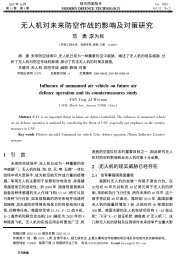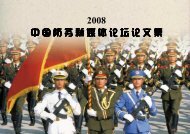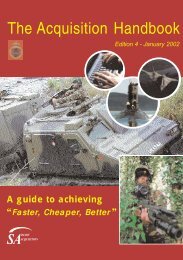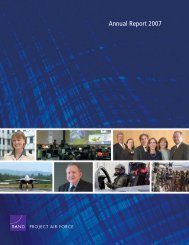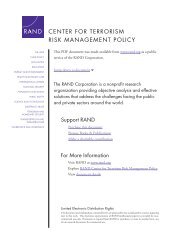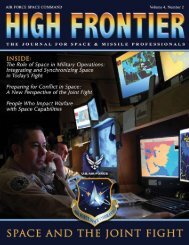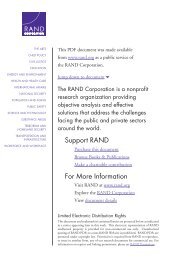How Terrorist Groups End - RAND Corporation
How Terrorist Groups End - RAND Corporation
How Terrorist Groups End - RAND Corporation
Create successful ePaper yourself
Turn your PDF publications into a flip-book with our unique Google optimized e-Paper software.
<strong>End</strong>ing the “War” on Terrorism 125<br />
Policing and Intelligence<br />
This strategy should include rebalancing U.S. resources and attention<br />
on police and intelligence work. It also means increasing budgets at the<br />
CIA, U.S. Department of Justice, and U.S. Department of State, and<br />
scaling back the U.S. Department of Defense’s focus and resources on<br />
counterterrorism. U.S. special operations forces will remain critical, as<br />
will U.S. military operations to counter terrorist groups involved in<br />
insurgencies.<br />
This also requires the development of a strategy with police and<br />
intelligence as its backbone. Unlike the military, local police and intelligence<br />
agencies usually have a permanent presence in cities and towns,<br />
a better understanding of local groups, and human sources. As Bruce<br />
Hoffman argued, a critical step in countering terrorist groups is for<br />
law-enforcement officials to<br />
develop strong confidence-building ties with the communities<br />
from which terrorists are most likely to come or hide in. . . . The<br />
most effective and useful intelligence comes from places where<br />
terrorists conceal themselves and seek to establish and hide their<br />
infrastructure. 8<br />
Some have argued that history has little to offer, since al Qa’ida’s global<br />
breadth and decentralized organizational structure make it somewhat<br />
different from many other terrorist organizations, even religious ones.<br />
As Rohan Gunaratna argued, “Because there is no historical precedent<br />
for al Qaeda, the past offers very little guidance.” 9 But this is not true.<br />
While al Qa’ida is different from many other terrorist organizations<br />
because of its global reach, its modus operandi is not atypical. Like<br />
other groups, its members need to communicate with each other, raise<br />
funds, build a support network, plan and execute attacks, and establish<br />
a base (or bases) of operation. Most of these nodes are vulnerable to<br />
penetration by police and intelligence agencies. The downside of this<br />
8 Hoffman (2006, p. 169).<br />
9 Gunaratna (2002, p. 296).




